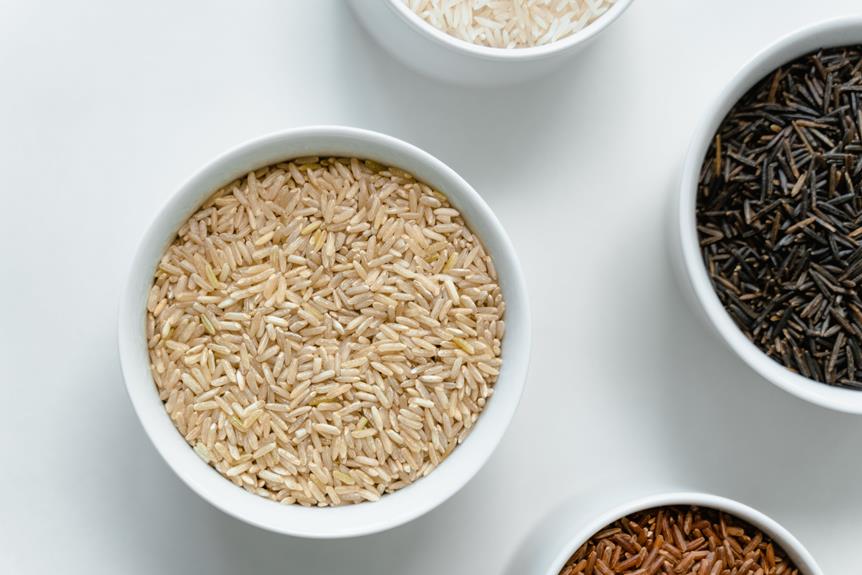Picture your digestive system as a well-oiled machine, efficiently breaking down food and absorbing essential nutrients. Now imagine if there was a way to enhance this process, ensuring optimal digestive health. Well, look no further than fiber. This unassuming nutrient plays a crucial role in keeping your gut happy and functioning smoothly. But how exactly does fiber accomplish this? In this discussion, we will explore seven ways in which fiber can bolster your digestive health, leaving you with a renewed appreciation for this humble nutrient. So, let's dive in and discover the secrets behind the power of fiber.
Key Takeaways
- Fiber promotes regular bowel movements, prevents constipation, and supports growth of beneficial gut bacteria.
- Fiber acts as a prebiotic, fueling the growth of diverse strains of bacteria and promoting gut barrier integrity.
- Adequate fiber intake prevents constipation, reduces the risk of digestive disorders, and maintains smooth digestive function.
- Fiber-rich foods support healthy weight management, reduce inflammation, and strengthen the gut microbiome.
Gut Health and Fiber Connection
Improving your gut health is directly linked to consuming an adequate amount of fiber. Fiber plays a crucial role in maintaining a healthy gut by promoting regular bowel movements, preventing constipation, and supporting the growth of beneficial gut bacteria. When you consume enough fiber, it acts like a broom that sweeps through your intestines, helping to keep everything moving smoothly and efficiently.
Fiber is a type of carbohydrate that cannot be digested by your body. Instead, it passes through your digestive system relatively intact, adding bulk to your stool and providing various health benefits along the way. By increasing the volume and softness of your stool, fiber helps to prevent constipation and reduce the strain during bowel movements.
Furthermore, fiber acts as a prebiotic, which means it provides nourishment for the good bacteria in your gut. These beneficial bacteria, also known as probiotics, help to maintain a healthy balance in your gut microbiome, which is essential for proper digestion and overall well-being. They help to break down and ferment fiber, producing short-chain fatty acids that provide energy to the cells lining your intestines.
In addition to promoting regular bowel movements and supporting the growth of beneficial gut bacteria, fiber also helps to regulate blood sugar levels, lower cholesterol, and maintain a healthy weight. It can help you feel fuller for longer, reducing the likelihood of overeating and supporting weight management.
To improve your gut health, aim to consume a variety of high-fiber foods such as fruits, vegetables, whole grains, legumes, and nuts. It is recommended to gradually increase your fiber intake to avoid digestive discomfort. Remember to drink plenty of water, as fiber absorbs water and helps to soften your stool. By incorporating fiber-rich foods into your diet, you can support a healthy gut and overall digestive wellness.
Improved Bowel Movements With Fiber
If you're looking to improve your bowel movements, fiber is your answer. Fiber promotes regularity by adding bulk to your stools, making them easier to pass. Not only does fiber prevent constipation, but it also helps maintain overall digestive health.
Regularity and Fiber
Adding fiber to your diet can significantly enhance your bowel movements, promoting regularity and improved digestive health. Fiber has the ability to add bulk to your stool, making it easier for your body to pass waste through the digestive system. This means that you are less likely to experience constipation or irregular bowel movements. When you consume enough fiber, it acts as a natural regulator, keeping your digestive system running smoothly. It helps to prevent bloating and discomfort by ensuring that waste moves through your intestines at a healthy pace. Furthermore, fiber can help prevent the risk of developing hemorrhoids, as it reduces the strain and pressure during bowel movements. So, by incorporating fiber-rich foods into your diet, you can enjoy the benefits of regular and effortless bowel movements.
Fiber and Constipation
Are you looking for a natural solution to improve your bowel movements and relieve constipation? Fiber can be the answer you've been searching for. Here's how fiber helps with constipation:
- Increases stool bulk: Fiber adds bulk to your stool, making it easier to pass through your digestive system.
- Softens stool: Soluble fiber absorbs water and adds moisture to your stool, making it softer and easier to pass.
- Speeds up transit time: Insoluble fiber helps move waste through your intestines more quickly, reducing the chances of constipation.
- Stimulates bowel movements: Fiber stimulates the muscles in your intestines, promoting regular bowel movements.
Digestive Health Benefits
To improve your bowel movements and promote better digestive health, incorporating fiber into your diet offers a natural solution. Fiber acts as a bulking agent, adding bulk to your stool and making it easier to pass through your digestive system. It also helps regulate bowel movements by increasing the frequency of stool elimination. By including fiber-rich foods such as whole grains, fruits, vegetables, and legumes in your meals, you can ensure a healthy and regular digestive system. Here is a table showing some fiber-rich foods you can incorporate into your diet:
| Food | Fiber Content (per 100g) |
|---|---|
| Avocado | 6.7g |
| Chia Seeds | 34.4g |
| Lentils | 7.9g |
Remember to gradually increase your fiber intake and drink plenty of water to help the fiber move through your digestive system smoothly.
Fiber's Role in Preventing Constipation
To prevent constipation, fiber plays a crucial role in promoting regular bowel movements and softening stool consistency. By increasing the bulk and water content of your stool, fiber helps to move waste through your digestive system more efficiently. Incorporating high-fiber foods into your diet can help prevent constipation and maintain a healthy digestive system.
Promotes Regular Bowel Movements
Increasing your fiber intake can play a vital role in promoting regular bowel movements and preventing constipation. Here are four ways fiber helps keep your digestive system running smoothly:
- Adds bulk to your stool: Fiber absorbs water as it passes through your digestive tract, increasing the size and weight of your stool. This helps stimulate the muscles in your intestines, promoting regular bowel movements.
- Speeds up transit time: Fiber helps move food through your digestive system more quickly, reducing the time waste spends in your colon. This prevents constipation and the discomfort that comes with it.
- Provides natural lubrication: Certain types of fiber, like psyllium husk, form a gel-like substance when mixed with water. This helps soften your stool and makes it easier to pass.
- Feeds beneficial gut bacteria: Fiber is a prebiotic, which means it serves as food for the good bacteria in your gut. These bacteria produce short-chain fatty acids that promote healthy bowel movements.
Softens Stool Consistency
One important way that fiber prevents constipation is by softening stool consistency. When you consume an adequate amount of fiber, it adds bulk to your stool, making it easier for it to pass through your digestive system. This bulkiness is due to the fact that fiber absorbs water as it moves through your intestines, which results in softer and more easily passed stools. By softening the consistency of your stool, fiber helps prevent constipation and promotes regular bowel movements. It also reduces the strain and discomfort that can occur when passing hard, compacted stools. Increasing your fiber intake through foods like fruits, vegetables, whole grains, and legumes can significantly improve your digestive health and prevent constipation.
Fiber and Its Impact on Gut Bacteria
Fiber plays a crucial role in shaping the composition of gut bacteria. When it comes to your digestive health, the impact of fiber on your gut bacteria cannot be overstated. Here are four ways fiber influences the population and diversity of your gut bacteria:
- Promotes the growth of beneficial bacteria: Fiber acts as a prebiotic, providing nourishment for the good bacteria in your gut. These beneficial bacteria, such as Bifidobacteria and Lactobacilli, thrive on the fermentable fibers found in fruits, vegetables, and whole grains. By fueling their growth, fiber helps maintain a healthy balance of gut bacteria.
- Increases microbial diversity: Different types of fiber feed different strains of bacteria. By consuming a variety of fiber-rich foods, you promote the growth of a diverse range of gut bacteria. This diversity is important because it enhances the overall stability and resilience of your gut microbiome.
- Enhances production of short-chain fatty acids: When gut bacteria ferment fiber, they produce short-chain fatty acids (SCFAs) as a byproduct. SCFAs, such as butyrate, acetate, and propionate, have numerous health benefits. They provide energy for the cells lining your colon, help regulate inflammation, and support a healthy immune system.
- Improves gut barrier function: Fiber helps maintain the integrity of the gut barrier, which is crucial for preventing harmful substances from entering your bloodstream. By promoting the growth of beneficial bacteria and producing SCFAs, fiber helps strengthen the gut barrier, reducing the risk of leaky gut and related digestive disorders.
Fiber's Ability to Reduce the Risk of Digestive Disorders
Consuming an adequate amount of fiber can significantly reduce your risk of developing digestive disorders. Fiber plays a crucial role in maintaining a healthy digestive system by promoting regular bowel movements and preventing constipation. By adding more fiber to your diet, you can prevent a range of digestive disorders and improve your overall gut health.
One of the primary benefits of fiber is its ability to prevent constipation. When you consume enough fiber, it adds bulk to your stool and helps it move through the digestive tract more efficiently. This prevents the stool from becoming hard and difficult to pass, reducing the risk of constipation. By avoiding constipation, you can also lower the chances of developing conditions like hemorrhoids and diverticulosis.
Fiber also helps to regulate your blood sugar levels, which can lower the risk of developing type 2 diabetes. By slowing down the absorption of sugar into the bloodstream, fiber prevents spikes in blood sugar levels. This not only reduces the risk of diabetes but also helps in managing the condition for those who are already diagnosed.
Additionally, fiber can lower the risk of developing certain types of digestive cancers, such as colon cancer. It helps by speeding up the passage of food through the intestines, reducing the contact time between harmful substances and the colon lining. This can prevent the formation of cancer-causing compounds and reduce the risk of developing colon cancer.
Fiber's Role in Maintaining a Healthy Weight
To maintain a healthy weight, incorporating fiber into your diet is essential. Fiber plays a crucial role in weight management by promoting satiety, regulating blood sugar levels, and supporting a healthy digestive system. Here are four ways fiber can help you maintain a healthy weight:
- Feel fuller for longer: Foods rich in fiber, such as fruits, vegetables, whole grains, and legumes, take longer to digest, keeping you feeling fuller for longer periods. This can help prevent overeating and unnecessary snacking between meals.
- Control blood sugar levels: Soluble fiber found in foods like oats, barley, and beans can help regulate blood sugar levels by slowing down the absorption of sugar into the bloodstream. This can prevent spikes and crashes in energy levels, reducing cravings for sugary and high-calorie foods.
- Aid in healthy digestion: Fiber adds bulk to your stool, promoting regular bowel movements and preventing constipation. A healthy digestive system is important for maintaining a healthy weight, as it allows for efficient nutrient absorption and waste elimination.
- Reduce calorie intake: High-fiber foods are often lower in calories and higher in nutrients compared to processed and low-fiber options. By incorporating more fiber into your diet, you can naturally reduce your calorie intake while still feeling satisfied and nourished.
The Link Between Fiber Intake and Reduced Inflammation
Incorporating an adequate amount of fiber into your diet has been shown to have a positive impact on reducing inflammation in the body. When you consume enough fiber, it acts as a natural anti-inflammatory agent, helping to combat chronic inflammation that can lead to various health problems. Fiber works by promoting the growth of beneficial gut bacteria, which play a crucial role in modulating the body's immune response and reducing inflammation.
Research has consistently shown that individuals who consume a high-fiber diet have lower levels of inflammatory markers in their blood. This is because fiber helps to regulate the body's inflammatory response, preventing it from becoming overactive. By reducing inflammation, fiber can help alleviate symptoms of inflammatory conditions such as arthritis, asthma, and inflammatory bowel disease.
But how does fiber achieve this anti-inflammatory effect? One way is by binding to toxins and waste products in the digestive tract and removing them from the body. By doing so, fiber prevents these harmful substances from triggering an inflammatory response. Additionally, fiber helps to maintain a healthy gut barrier, preventing the leakage of harmful substances into the bloodstream, which can also lead to inflammation.
It's important to note that different types of fiber may have varying effects on inflammation. Soluble fiber, found in foods like oats, fruits, and vegetables, forms a gel-like substance in the gut, which can help to reduce inflammation. On the other hand, insoluble fiber, found in whole grains and nuts, adds bulk to the stool and promotes regular bowel movements, preventing constipation and reducing inflammation in the gut.
Frequently Asked Questions
How Much Fiber Should I Consume Daily to Promote Good Gut Health?
To promote good gut health, you should aim to consume the recommended daily amount of fiber. The exact amount may vary depending on factors such as age and gender. However, on average, adult men should aim for around 38 grams of fiber per day, while adult women should aim for about 25 grams. It's important to gradually increase your fiber intake and drink plenty of water to prevent digestive discomfort.
Can Increasing Fiber Intake Lead to Excessive Gas and Bloating?
Increasing your fiber intake can lead to excessive gas and bloating. When you consume more fiber than your body is used to, it can take time for your digestive system to adjust. This can result in increased gas production and bloating. However, these symptoms are usually temporary and will subside as your body adapts to the increased fiber intake. To minimize discomfort, gradually increase your fiber intake and drink plenty of water to help with digestion.
Are There Any Specific Types of Fiber That Are More Beneficial for Digestive Health?
There are indeed specific types of fiber that can be more beneficial for your digestive health. Some examples include soluble fiber, which can help soften stools and prevent constipation, and insoluble fiber, which can add bulk to your stool and promote regular bowel movements. Additionally, prebiotic fibers can nourish the beneficial bacteria in your gut, promoting a healthy digestive system. Including a variety of these fiber types in your diet can help support optimal digestive health.
Can Fiber Supplements Be a Substitute for Fiber-Rich Foods in Maintaining Gut Health?
Fiber supplements may seem like a convenient option, but they can't fully replace fiber-rich foods in maintaining gut health. While they can provide some benefits, such as relieving constipation, they lack the many other nutrients and health-promoting compounds found in whole foods. Eating a variety of fiber-rich foods, like fruits, vegetables, whole grains, and legumes, is still the best way to support your digestive health. So, don't rely solely on supplements, but aim for a balanced diet.
Does Cooking or Processing Fiber-Rich Foods Affect Their Digestive Health Benefits?
Cooking or processing fiber-rich foods can affect their digestive health benefits. High heat can break down the fiber and reduce its effectiveness in promoting a healthy gut. However, some cooking methods, like steaming or lightly sautéing, can help retain the nutritional value of the fiber. It's important to choose whole, unprocessed foods whenever possible to get the maximum benefits of fiber for your digestive health.




